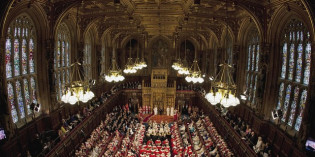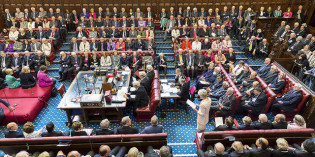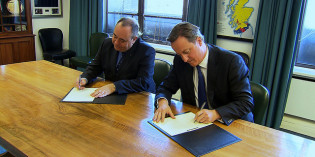Tag: Mark Elliott

The 2016 Queen’s Speech and the Constitution
Mark Elliott looks in detail at the at the constitutional proposals in the latest Queen’s Speech. He writes that although they have the potential to be highly significant it is unclear whether they will amount to much as the Government’s thinking appears to be underdeveloped. Similar PostsTheresa May’s case for withdrawal from the ECHR: Politically […]

Theresa May’s case for withdrawal from the ECHR: Politically astute, legally dubious, constitutionally naïve
Theresa May belongs to the Remain camp, yet favours leaving the ECHR. Mark Elliott analyses the arguments she has put forward to justify this position, and writes that although May’s position might be politically savvy, it turns upon legally specious distinctions between the EU and ECHR legal regimes, and is ultimately undermined by its constitutional naivety. […]

Parliament, Government and Secondary Legislation: Lords Select Committees respond to the Strathclyde Review
Following the House of Lords’ refusal to allow the government to enact secondary legislation during the row over tax credits cuts last year, the government set up the Strathclyde Review, which suggested reforms which could alter the balance between the government and the two houses of parliament. Here, Mark Elliott welcomes calls from various parliamentary committees […]

The Strathclyde recommendations, if implemented, could give rise to a de facto form of unicameralism
On 17 December, the government published a review by Lord Strathclyde on secondary legislation and the relationship between the House of Lords and the House of Commons. If the recommendations were implemented the House of Lords would lose its power to veto statutory instruments. Mark Elliott outlines three salient matters pertaining to statutory instruments, and, in the […]

The recent change to the Ministerial Code is about more than simply economical drafting
Earlier this month, the Ministerial Code was amended so that it no longer makes reference to any obligation to comply with international law. Mark Elliott argues the new wording is an unhelpful oversimplification which raises fundamental questions about the relationship between different types of legal norms. Unless it were envisaged that the UK Parliament would legislate in a way that […]

Michael Gove’s evidence to the Commons’ Justice Committee gives a preview of the Government’s case to repeal the Human Rights Act
Earlier this week Michael Gove, now the Justice Secretary (and Lord Chancellor) recently gave evidence to the House of Commons Justice Committee regarding the Government’s policy on the future of the Human Rights Act. Mark Elliott looks at Gove’s evidence, and finds within it a preview of the case that will be made if and […]

A response to Daniel Hannan: a “UK Sovereignty Act” would make no legal sense
Do we need a UK Parliamentary “Sovereignty” Act, as proposed by the Conservative MEP Daniel Hannan on ConservativeHome, to reassert sovereignty over the European Union? Mark Elliott argues that such an Act might make political sense for the Government, but that Hannan’s argument is based upon fundamental misconceptions about the legal status of the UK and EU’s […]

After Scotland’s ‘No’ vote, what next for the UK constitution?
The UK constitution does not currently conform to any particular, identifiable model. Nor would it do were the constitutional reforms currently being proposed by the Government and various other parties come to pass. For example it would not be characterisable either as a federal system or as a unitary state. Rather, the constitution would remain messy and […]

The reform of judicial review is now an ongoing state of affairs rather than a one-off event
The government’s proposed reforms of judicial review have been criticised by campaigners and the legal profession. In this post, Mark Elliott examines how the government has changed direction in response to this criticism. He finds, however, that the refusal to reconsider changes to the “makes no difference” legal principle means that unlawful administrative actions by public […]

Will the Scottish referendum (whatever the outcome) lead to a federal constitution for the UK?
Welsh First Minister Carwyn Jones has suggested the UK’s unwritten constitution is no longer able to manage the complexities of devolution, a problem that will need to be addressed regardless of the choice Scotland makes in the independence referendum. Dr Mark Elliott argues this raises important questions not only about the extent of devolution, but […]


 Democratic Audit's core funding is provided by the Joseph Rowntree Charitable Trust. Additional funding is provided by the London School of Economics.
Democratic Audit's core funding is provided by the Joseph Rowntree Charitable Trust. Additional funding is provided by the London School of Economics.